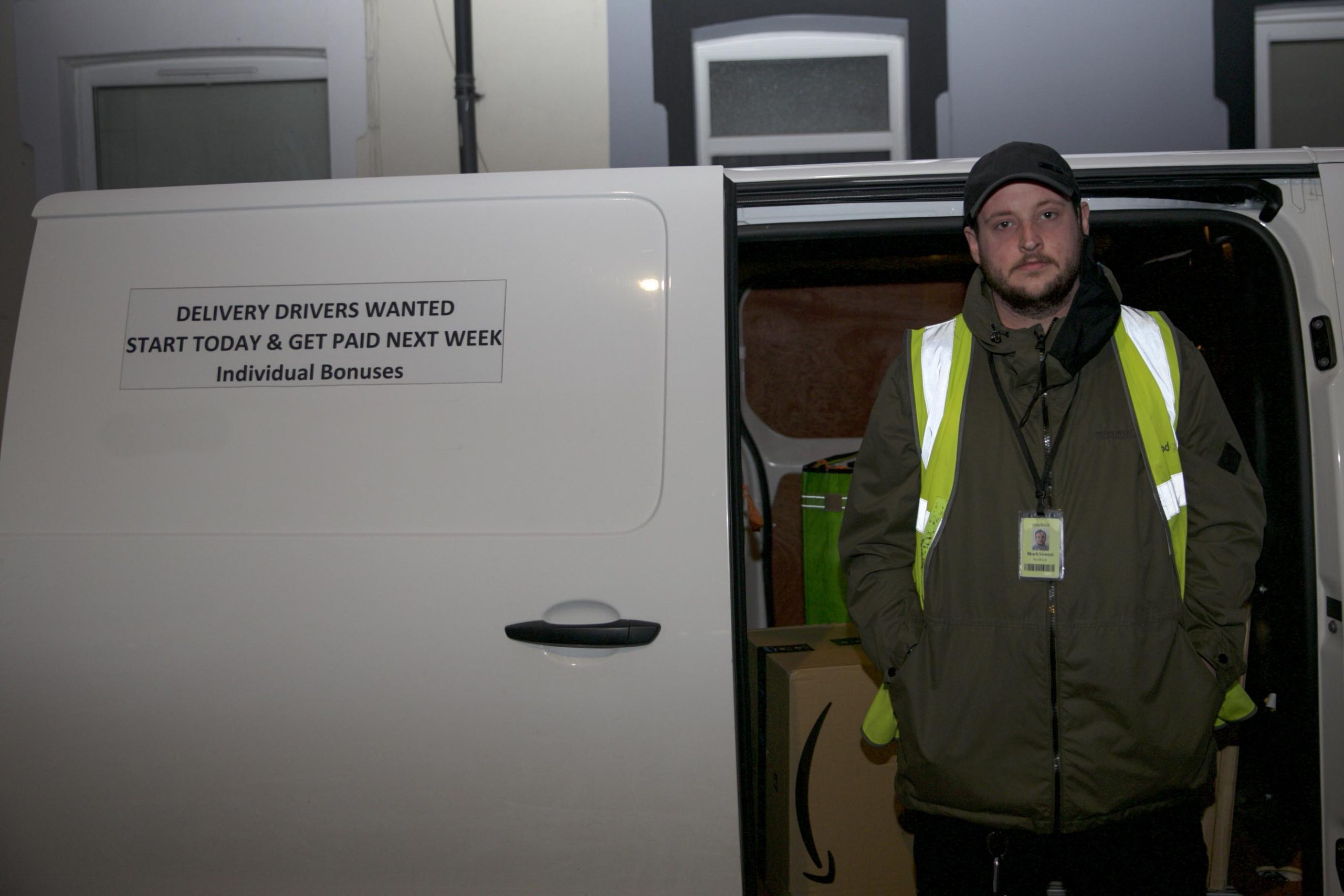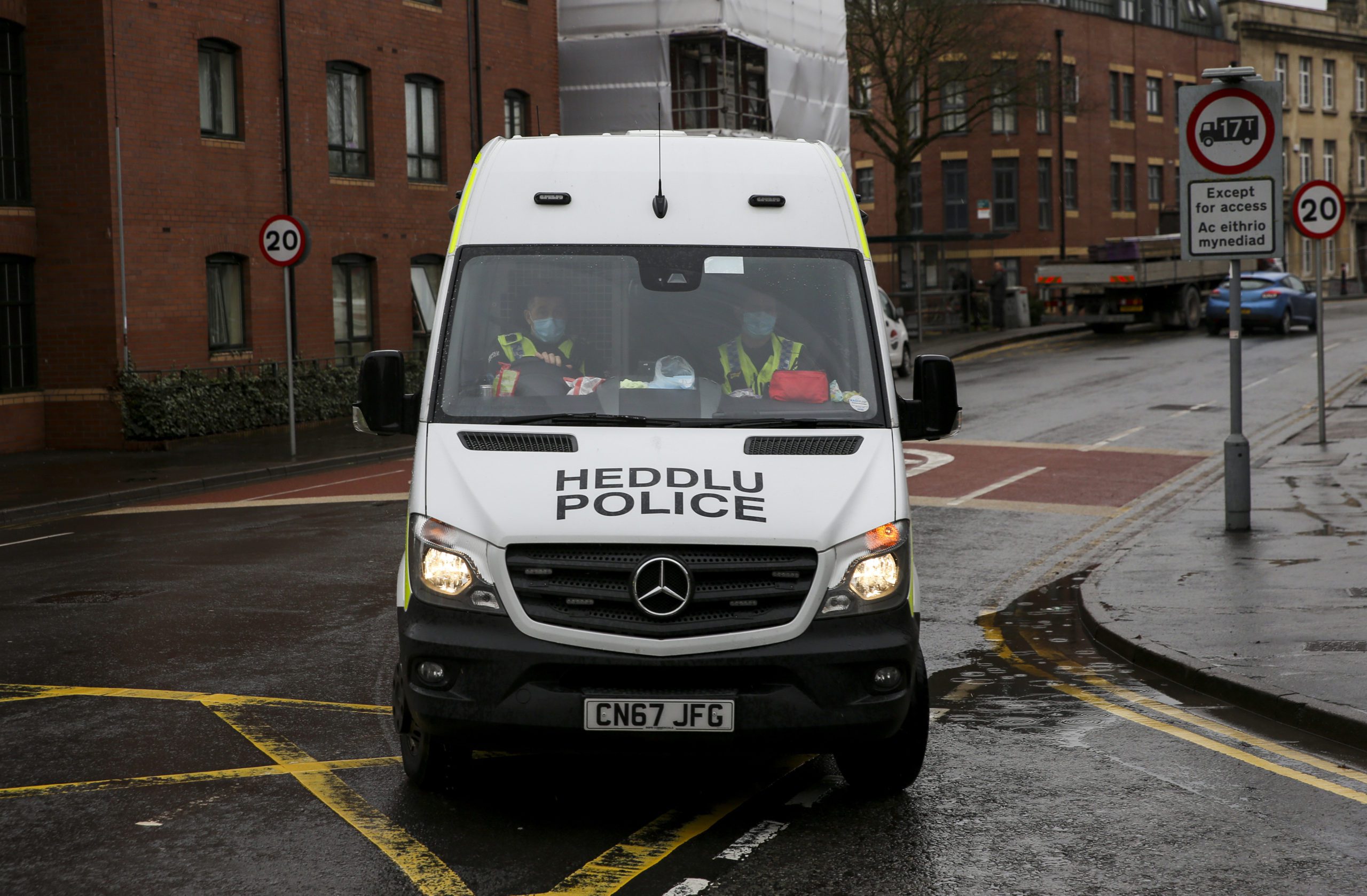
As An Amazon Worker, I Was Turned Into A Robot For Profit | Mark Redfern
For over six weeks I worked as an Amazon courier and saw the exploitative conditions up close. This is what I learnt.
Image: Mark Redfern working as an Amazon delivery driver. By Tom Davies
Like so many people forced to sell their labour to survive, I was skint.
There’s not a wealth of opportunity around mid-Wales where I live, so I looked to return to my hometown of Swindon to earn some quick cash for a couple of months.
I’d done some courier work for a firm contracted by Amazon from the local depot back in 2018 and I didn’t remember it being that bad, but I was even more hard-up for cash and in retrospect would put up with a lot more grief for a pay packet.
Since then the tycoon behind Amazon, Jeff Bezos, has had his wealth inflate from the back-breaking labour his workers endure in his warehouses. His managers clamber to provide him with maximum efficiency from the workers. This tight regime has gifted him the title of the world’s richest man.
I arrived late a couple of times during my time at the depot. I was knackered every night from my rounds which, unfortunately, sometimes found me speeding down to the depot in my Vivaro van to avoid getting a bollocking from the managers. Because the bosses are also being pushed you’re not likely to get a telling off in the depot, instead your badge number or the plates of your van are recorded for every wrong move and filed away for reference at a later date. But to be honest, I’d rather be shouted at than have the hidden danger of it all being brought up at once and being sacked on the spot.
This is the atmosphere Amazon was looking to impress on the workers. You’re being monitored constantly as the yard marshals pace like screws, occasionally barking orders at drivers for leaving their hazard lights on. Inside the depots you don’t have much time to talk to others about your experiences or how to improve them either. You arrive, load up your van, and get out of there after which your every move is tracked by computers and satellites for managers to monitor. Even the music inside the warehouses blared loud in what seemed to be a clever move by management to discourage talking to others.
The work was laborious out on the roads. The knowledge that you’re being watched made you feel guilty for catching some time for a quick smoke or taking your designated meal break – which you’re technically supposed to take. But when I asked around the drivers I could actually talk to whether or not they actually use the pop-up on their app that signals that it’s their time to eat lunch halfway into their shift, I couldn’t find a single worker who regularly took their allotted time.
One driver told me he did, once, and had a telling off for a manager who noticed his van was standing still for longer than usual. After that he either bought food he could eat whilst driving to his next stop or just waited out the hunger pangs.
Nobody can enjoy this work. The money was useful but for it I was being sent from my home in Swindon to depots in Avonmouth or Newport, which would take me on routes in Weston-Super-Mare or Merthyr Tydfil that I would have to drive back from for a small bonus that hardly seemed worth the effort. I often think of the workers with kids and how little time these routes actually give them with their children at the end of a hard day’s graft, again, for the world’s richest man.
Some of the managers saw how hard we worked and sympathised, because they had all done the job themselves at some point as far as I could tell.
Some, though, knew that the workers under their command were desperate for money and wielded it like a stun gun. If they wanted shifts filled they would snarl at the workers in all-caps, beamed directly to the personal phones of workers in the evenings, to get what they wanted. If you spoke back, workers were told that nobody is forcing you to work here and there are plenty of other companies out there.
When I asked to get in contact with the owner of the firm, even as a journalist seeking press comment, my bosses wouldn’t allow his information to be given out.
We didn’t see any sign of him throughout our shifts and it wasn’t like I could bump into him down the depot. I’m sure if we started a unionisation push he would quickly appear to quell the dissent.
But even the ‘good’ supervisors can’t change the fact that they are employed as enforcers to the workers below them.
Amazon needs an army of trodden-upon workers to distribute their products. The sorting, picking, packing, and delivering needs a constant supply of intensive labour effort to keep Bezos in the top spot of global wealth, which is why the company is so eager to put people off unionising.
Instead they flaunt a small committee with representatives of workers giving ‘feedback’ to managers about issues on the warehouse floors, and they post up their action points on a prominent whiteboard near their covid testing station in the Avonmouth depot. It doesn’t take much critical thinking to see that this committee is set up by bosses to give workers the illusion of control – but no one is buying it.
We need real workers organisation and power at Amazon. This will not be easy, though, and couriers are especially hard to organise because they are deliberately kept separate and divided amongst many small contractor firms, allowing little kings to deal with the fury of their own pool of irritated subjects, away from the Amazon billions.



1 Comment
Comments are closed.